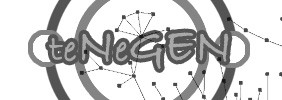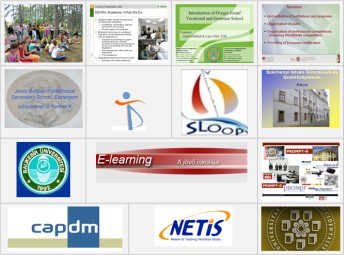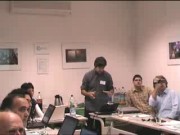|
EVENTS: “The future’s school – e-learning” conference was arranged in Hungary by the National Institute for Vocational and Adult Education in Budapest, on the 1st of October 2008. The aim was to disseminate the new developments regarding the National Registry of Qualification, to demonstrate the results of the digital learning content for the VET, and to discuss how the potential of the new networking tools can be harnessing in the traditional environment of the VET schools. See the details in the next part of this document.
|
Kick-off evaluation
After the meeting the partners were asked to fill in an online questionnaire to evaluate the three working day of the meeting. The Co-cordinator summarized the results in two documents, namely: “Kick-off minutes” and “Kick-off evaluation report”, and published them for the partners on the Tenegen portal. All presentations by the partners were recorded and published on the portal (http://www.tenegen.eu/content/video/videolist).
|
Activities
Project portal: http://www.tenegen.eu – a Drupal-based platform for the collaboration. We published here general information on the project, studies related the innovation to transfer, and started discussions for the WP1-WP2, and integrated a common vocabulary – called “Network Learning’ to develop the Tenegen taxonomy.
As a first step towards the main objectives, the Consortium decided to elaborate online questionnaire for VET teachers and trainers (for the target group of the project) to measure how far are they aware of the educational changes emerged by the new generation of open, social networking tools. How far are the teachers trained in using Web 2.0 tools, which enable peers and teachers to connect to each other, to learn from each-other while sharing and distributing knowledge and new ideas in the people-based networking environment.
The survey will be discussed during the next two month, and published online in March 2009. We plan to carry on the survey in Hungary, in Turkey, in Germany and in Italy, and to start the effective content development based on the results of the survey. Parallel with the needs-analysis, the partners are elaborating a common taxonomy in the new pedagogical model – the taxonomy of network learning – and design the five module of the Tenegen course.
|
Dissemination in Hungary
On 1st of October 2008 a “The future’s school - elearning” conference was established by the Institutite of Vocational and Adult Education (NIVE – P7) in Budapest. The aims of the conference were
- to discuss the results and the possibilities of the future developments of the network learning methods in the Hungarian vocational education
- to disseminate the results of the national HEFOP 3.2.1 project: “Renewing th National Registry of Qualification”
From the Tenegen partnership the representatives of two partners ISERG, NIVE and Prompt took part as speakers with presentations:
- Dr. István Bessenyei: Network learning – opportunities and tensions
- Mária Hartyányi: Network Learning in practice
- István Kiszter: Establish the conditions of knowledge and learning network on the basis of NIVE
The speakers gave a summary report about the aims and objectives of Tenegen project. Other Tenegen partners, ÖSZJIG and BJMSZ send their representative to take part on the discussions too.
|
9th of December, 2008 a valorisation conference was arranged by the Tempus Foundation (the Hungarian National Agency) in Budapest, titled “Renewal of the pedagogical profession – in the framework of the European Life Long Learning Programme”. The main focus of the conference was to disseminate the results of the Hungarian projects founded by the EU in the frame of the Life Long Learning project. It was arranged with 200 participants from the Hungarian vocational and higher education. After the plenary presentations seminars in different fields were organized giving opportunities to show best practices and to generate living discussions related to the presentations.
From the Tenegen consortium the representative of Prompt gave a presentation on the seminar titled “Autonomy and responsibility of the teachers”. In her presentation Mária Hartyányi gave an introduction to the aim and objectives of the Tenegen project. Many of the participants (VET teachers, professors from the higher education) were deeply interested in the project aims, and they expressed intention to join to the planned activities.
|
|
Project basics
Acronym: TENEGEN
Title: Connect the teachers to reach and teach the Net Generation
Duration: 1.October 2008 – 30. September 2010
Action type: Transfer of Innovation
Programme: Leonardo da Vinci – LLL Subprogramme
Participating countries: Italy, Germany, Turkey, United Kingdom, Hungary
Website: http://www.tenegen.eu
Contact: Mária Hartyányi, Prompt-G Educational Centre for Informatics, Hungary
E-mail: maria.hartyanyi@prompt.hu, skype: hmaria718
|
|
Partnership
| PROMPT |
Prompt-G Educational Centre for Informatics, HU (Co-ordinator) |
| CNR |
National Research Council - Institute for Educational Technology, IT |
| ISERG |
Information Society Education and Research Group University of West Hungary, HU |
| CAPDM |
CAPDM Ltd,.UK |
| DEKRA |
DEKRA Akademie GmbH, DE |
| BUNI |
Balýkesir University TR |
| ÖJSZIGK |
Öveges József Vocational and Grammar School, HU |
| NIVE |
National Institute of Adult and Vocational Education, HU |
| BJMSZ |
Bottyán János Vocational Secondary School, HU |
| KGYGIVSZ |
Krúdy Gyula Secondary School, HU |
| SZIGSZ |
Széchenyi István Secondary Grammar School, HU |
|
Target groups
- teachers and trainers in vocational education,
- trainers in adult education;
- school-leaders (headmasters) in VET schools and the staff of higher education institutes,
- students of vocational schools ;
- university students;
- policy makers;
- European e-learning providers.
|
Objectives
- elaborate a pedagogical model of network learning and ‘connectivism’;
- develop an online repository of Open Source Learning Objects;
- develop a TENEGEN network learning environment based on open source LMS;
- elaborate and implement five training modules in three languages (HU, EN, TR);
- establish pilot training courses for teachers and trainers;
- validate and verify the results in VET schools;
- disseminate the results all over Europe.
|
| Work-packages
| WP0 |
Project management |
| WP1 |
TENEGEN System Analysis and Design based on pedagogical and sociological outcomes of NETIS |
| WP2 |
TENEGEN Systems Analysis and Design based on the concept of SLOOP |
| WP3 |
Content development, review, translation |
| WP4 |
Implementation of TENEGEN networking platform |
| WP5 |
E-learning - the school of the future - Pilot course I. |
| WP6 |
Pilot course in VET schools |
| WP7 |
Evaluation |
| WP8 |
Dissemination and valorisation |
|
Planned results
Online further training programme for teachers and trainers in five module in three language (HU, EN, TR), implementing them in Moodle environment, and piloting the course in three countries (HU, EN, TR) and piloting them in the target (importer) countries Hungary and Turkey. The Consortium intended to deliver the new paradigm of network learning to the teachers and trainers in the vocational education, to help them “to reach and teach the Net Generation”.
|








